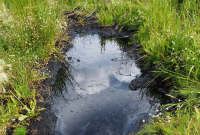Support strong Canadian climate journalism for 2025
The federal government remains alert to the possibility that trucks and protesters could return to Canada’s capital after police spent the weekend arresting demonstrators and dispersing blockades on Ottawa’s streets, Prime Minister Justin Trudeau said Monday.
Downtown was eerily quiet after weeks of overwhelming noise from honking horns, idling engines and large crowds protesting the Liberal government, vaccine mandates and COVID−19 restrictions.
Roads once choked with trucks and protesters have since been cleared, though some debris the demonstrators left behind had not yet been cleared away.
Still, Trudeau said his government is worried about blockades reforming in Ottawa and at Canada’s ports of entry.
"Even though the blockades are lifted across border openings right now, even though things seem to be resolving very well in Ottawa, this state of emergency is not over," Trudeau said at late morning news conference.
At a truck stop about an hour east of Ottawa on the main highway to Montreal, a few demonstrators pledged to return to the city.
Matt Wall of southern Manitoba said he was arrested but not charged Friday after police smashed the windows of the truck where he had zip−tied himself to the steering wheel.
"We finish it," he said Monday at the truck stop, adding he didn’t drive 28 hours straight just to go home at the first sign of resistance.
A few dozen vehicles were parked alongside big rigs there. Some flew Canadian flags or otherwise bore signs of the protest, including vulgar slogans attacking Trudeau and Quebec Premier Francois Legault.
Across the highway, dozens of vehicles — including a number of big rigs, recreational vehicles and pickup trucks — sat parked on a private farm.
Other demonstrators appear to have remained even closer. Just east of downtown Ottawa, a few of the pickup trucks sporting Canada flags and protest signs were seen on residential streets outside the police perimeter of the core, said Coun. Mathieu Fleury, who represents the area.
"I’m worried about it," Fleury said in an interview Monday. "I think the 100 checkpoints have helped, but certainly have not resolved the community’s angst."
Public Safety Minister Marco Mendicino said a number of people associated with the protest were still in the Ottawa area. Trudeau added that a convoy from Fort McMurray, Alta. en route to Ottawa was turned away at the Manitoba border a few days ago.
"The situation is still of people repositioning, people being out there indicating that they are ready to blockade, to continue their illegal occupation to disrupt Canadians’ lives," Trudeau said.
As the prime minister spoke, parliamentarians debated whether to approve extraordinary powers granted to police to quell the Ottawa protest. Some Conservatives argued the powers are no longer needed because the blockades are over.
One of the emergency measures allows banks to freeze accounts of those linked to the funding of the protests in Ottawa and elsewhere.
The RCMP said it provided banks with a list of influencers in the Ottawa demonstration and people who did not want to move their vehicles out of the area, but not information on individual donors. The Mounties in a statement said 219 financial products, which includes accounts, have been frozen so far.
Finance Minister Chrystia Freeland said anyone affected has an easy avenue to have their accounts unfrozen: "Stop being a part of the blockades."
Ottawa police on Monday said 196 people connected to the so−called Freedom Convoy protest had been arrested, with 110 of them facing a variety of charges. Among the arrests were two people who were arrested Friday, released with no charges, and then returned to the protest.
The Ottawa police statement said 115 protester vehicles have been towed.
Ottawa Mayor Jim Watson suggested to CBC News on Saturday that the vehicles should be sold to cover costs incurred by the city, but police say they will be impounded for a week then returned to their owners.
About 20 of those trucks were taken from a site outside the core that demonstrators allegedly used as a base camp.Police had promised officers would remain there to prevent anyone from returning to the site.
On Monday, the site was still littered with generators, chairs, tables, hay bales, and other debris abandoned around an otherwise empty shack, which flew a Canadian flag and a Fleur−de−lis, and was adorned with handwritten signs of all types.
Despite the government’s foreboding, Ottawa police have told businesses that closed their doors during the three−week demonstration that they should feel safe to reopen.
The Rideau Centre, Ottawa’s largest shopping mall, remained closed Monday. It shut its doors the first weekend the protest rolled into town.
Foot traffic was still banned in the area closest to Parliament Hill, but police removed checkpoints around the ByWard Market and part of the core, encouraging people to support local businesses affected by the protests.
Ottawa restaurant North and Navy announced plans to reopen Wednesday. It promised to buy dinner for several Ottawa residents who went viral over their opposition to the protests, as well as Zexi Li, the 21−year−old public servant who filed for a court injunction to stop trucks from honking their horns downtown.
Moo Shu Ice Cream closed after the first week of the protest after an alleged assault on a staff member during their commute to work. The ice−cream shop said it would celebrate the chance to reopen with ice cream tacos for "the most epic Taco Tuesday of our lifetime."
This report by The Canadian Press was first published Feb. 21, 2022.




Comments